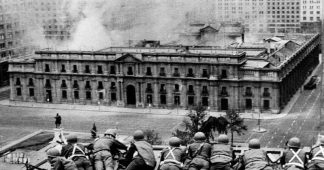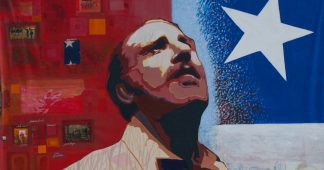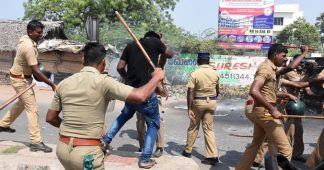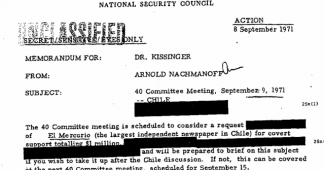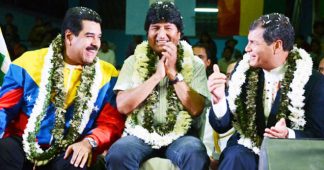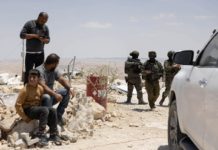The alarm blared at the state bank in the northern town of Chuquicamata, Chile, on March 9, 1981, prompting police to check the vault. They found it slightly ajar but nothing missing, so they locked it back up and went home. But by the time they returned the next morning, $1.1 million had vanished, along with bank guard Guillermo Martínez and cashier Sergio Yáñez.
A three-month nationwide hunt ensued, until early June, when Chile’s regime unexpectedly announced that the suspects’ dismembered bodies had been found in the Atacama Desert. Officials blamed the murders on corrupt secret police and promised that justice would be served. But those officials were lying to cover up a government-linked theft aimed at lining the coffers of the secret police.
Fabrications, kidnappings and other atrocities were common in Chile at the time. Under Augusto Pinochet’s dictatorship, DINA, the state-sponsored secret police force, systematically captured and killed perceived enemies. The U.S. turned a blind eye to the violence because it had helped facilitate Pinochet’s rise to power, but that grace period ended when regime critic Orlando Letelier was assassinated in a Washington, D.C., car bombing in 1976. The U.S. responded with calls for restraint, and DINA was subsequently shut down. But that didn’t mean it vanished — like a ravaged Hydra, it grew new heads, and by the time of the ’81 bank heist, Chile’s streets were teeming with government-bought goons.
The government tale went that Chilean officials Eduardo Villanueva and Army Maj. Gabriel Hernandez had staged the robbery, framed the bank employees and then killed them to cover their tracks. Another government investigator, Maj. Juan Delmas, was subsequently found dead with a bullet in his head in an abandoned car. Officials said it was suicide, but few believed that: No bullets were initially found, and the car was dust-free despite being in the desert.
Alarm bells were ringing about the whole mess. Pinochet’s regime was known to have used the pretense of maintaining law and order to hide atrocities connected to copper robberies, so reporters had every reason to be suspicious. In 1973, for example, engineer David Silberman, who managed Chile’s copper mines, was tortured to death as the result of “an apparent effort to find copper company funds [the regime] falsely believed he had taken after the [Pinochet] coup,” according to Peter Kornbluh’s The Pinochet File. The $13 million that Silberman was accused of stealing was not found but was probably pocketed by the government, says Spanish attorney Almudena Bernabeu, who has been working to extradite Silberman’s likely abductor from the U.S., where he currently lives.
Questions about the ’81 heist started to pile up. A magazine published an interview with Hernandez, who claimed that he was being “sacrificed” and that police members had ordered him to murder the bank employees. Around the same time, a recession was inflicting hardship nationwide. Pinochet’s privatization reforms backfired, squeezing the regime’s funds, according to University of Calgary associate professor Pablo Policzer. Foreign loans that supported trade agreements froze, debtors who borrowed foreign currencies on fixed exchanges began to sell, and residents feared that banks would close. The regime’s financial concerns led, according to Mary Helen Spooner, author of Soldiers in a Narrow Land: The Pinochet Regime in Chile, to the secret police’s upper echelon planning the heist in response to cutbacks. And while Kornbluh says there’s no way to know for sure how much money was stolen by the regime — owing to a “vast repressive network of people” — 120 of Pinochet’s secret bank accounts, containing a whopping $28 million in stolen funds, were uncovered after he was deposed.
Pinochet’s downfall, says Cornell professor Kenneth Roberts, was brought about by the combination of economic uncertainty and national terrorism that pushed opposing political parties into a common alliance to challenge the dictatorship. This led to an uprising, and in 1988, Pinochet accepted and lost a referendum to consolidate his power; he was then relegated to a role as Chile’s head of security until the late ’90s. But to this day, the “habits of repression are visible in parts of the country, especially if you’re a member of the underclass,” says Roberts.
By the time Hernandez and Villanueva were executed by firing squad on Oct. 22, 1982, the public knew the two men were most likely just the fall guys for a rotting regime. Chilean journalist Rubén Adrián Valenzuela witnessed the executions and noted how riflemen hit both men in the heart. When one of them moved, an officer shot him again at close range, guaranteeing the man’s silence in an extraordinary cover-up that ultimately would not stay buried.
